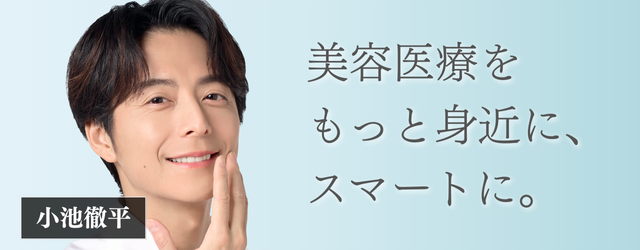Isotretinoin (Isotroin®/Acnetrent®/Acutein®) oral therapy

I wonder what isotretinoin is and how it works?"
I've heard it dries out your lips, and I'm worried about the risks/side effects."
'I'd like to try isotretinoin, but I don't know if I can find a hospital I can trust.'
Hello, I am a doctor at Smart Skin Clinic, a cosmetic dermatology clinic.
Do you have any of these questions or concerns?
In this article, our cosmetic dermatology clinic will explain these questions and concerns from a professional standpoint in an easy-to-understand manner.
*If you would like to know the rates, you can jump to the table of contents below.
Chairman of Smart Skin Clinic Group
stone Kouta
career
Graduated from Juntendo University School of Medicine
Tokyo Women's Medical University Hospital and related facilities
Worked at a major beauty clinic in Tokyo
Affiliation / Qualifications
Japan Surgical Society Specialist
Japanese Society of Anti-Aging Medicine
What is isotretinoin?
Isotretinoin is, simply put, an oral treatment for acne. It is classified as a vitamin A derivative.
andThe ultimate weapon in acne treatment."This medication is sometimes referred to as
Briefly on how it works,Atrophy of sebaceous glandsaction, thereby providing a therapeutic effect on acne.
Isotretinoin is the name of the ingredient, and there are several drugs with the trade names Accutane, Isotroin, Roaccutane, and Tretiva.
In Japan, it is not yet covered by insurance,Drugs that have been used for many years in other countrieswill be. Specifically,In Europe and the U.S., for about 35 years now.In the U.S., it was approved in 1982.
For moderate to severe acneAcne Treatment Guidelines" in the U.S. and Europe recommend a high level of oral isotretinoin treatment.Isotretinoin has risks and side effects, and must be prescribed under a physician's consultation.
Some of the actual Western "acne treatment guidelines" are shown below. For "Severe" acne, which may be difficult to understand in English,Isotretinoin" is listed as a "high strength of recommendation" treatment.
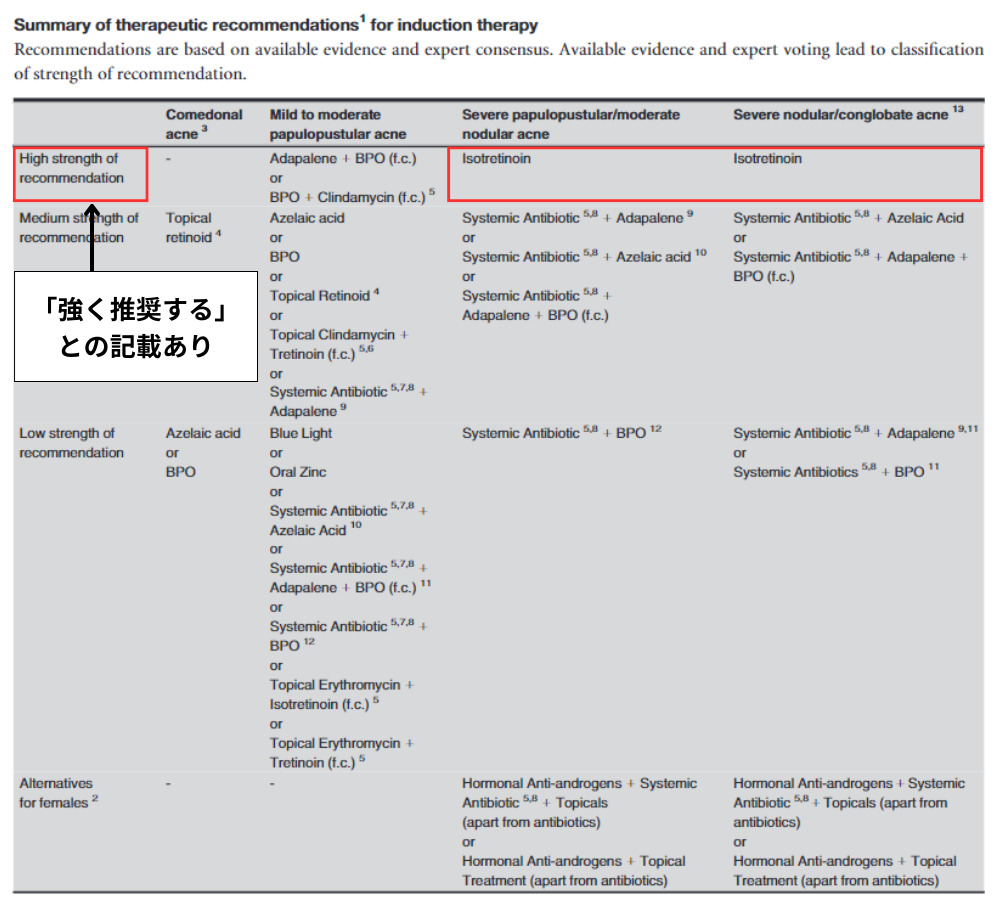
Please see our Instagram below for a visual explanation, if you prefer to understand visually rather than reading text.
Case study photographs (Before/After)
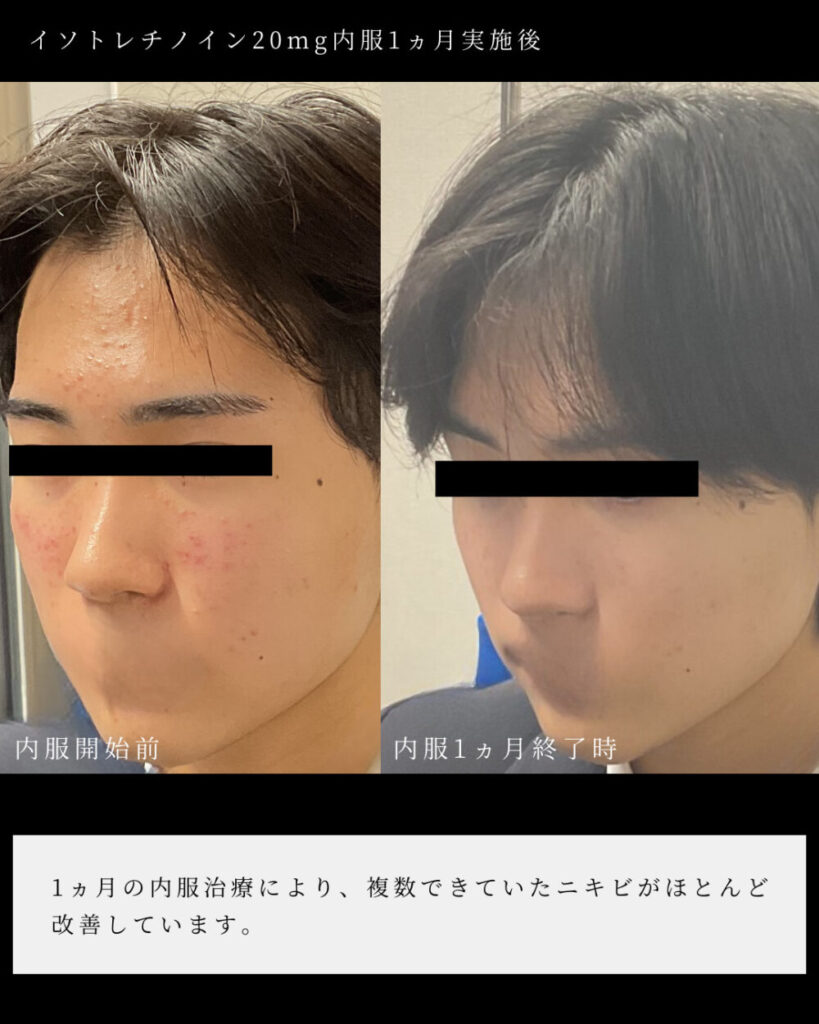

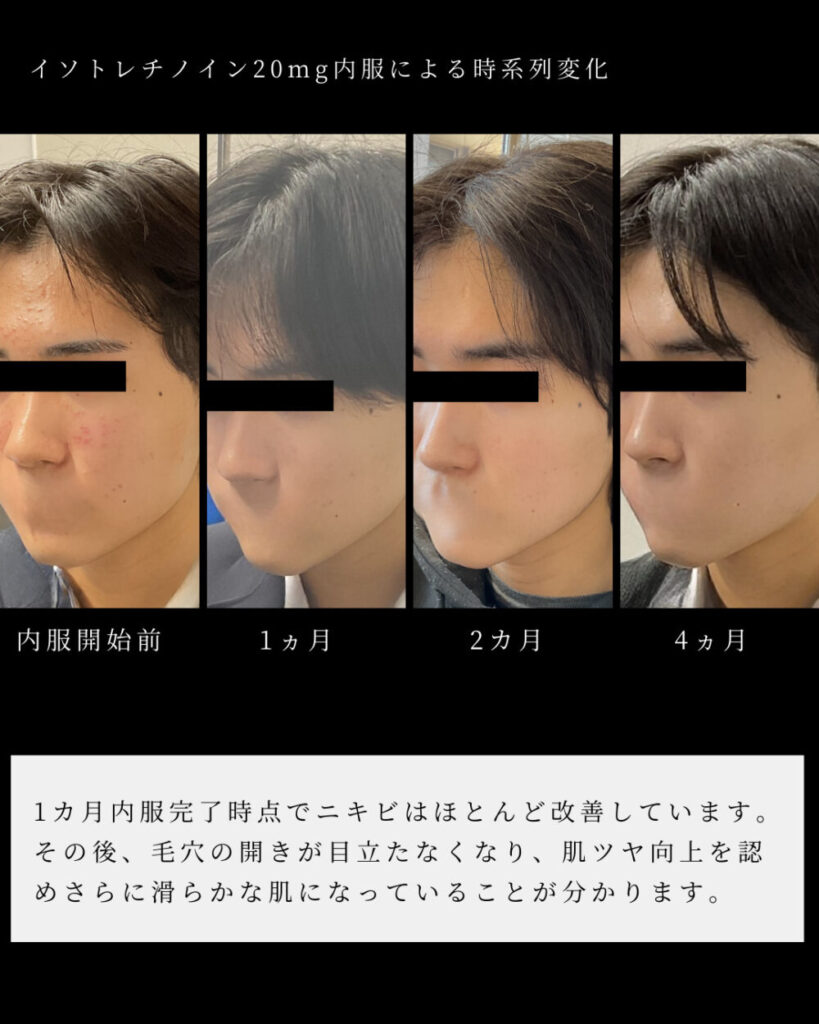
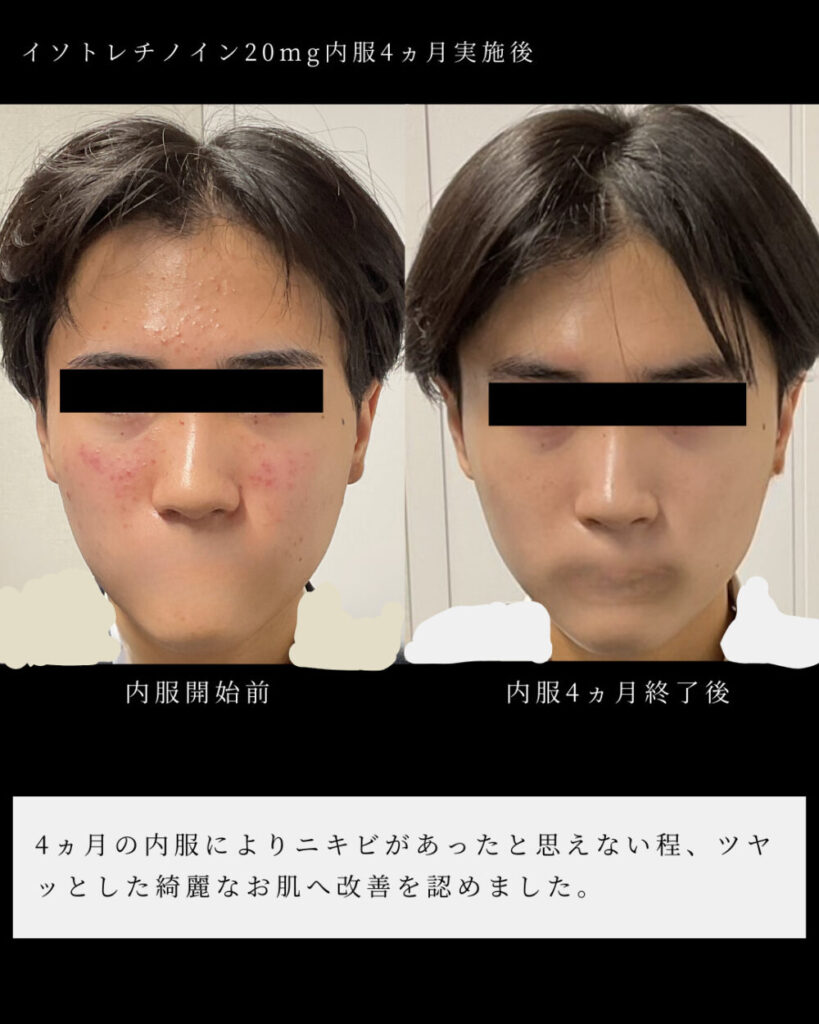
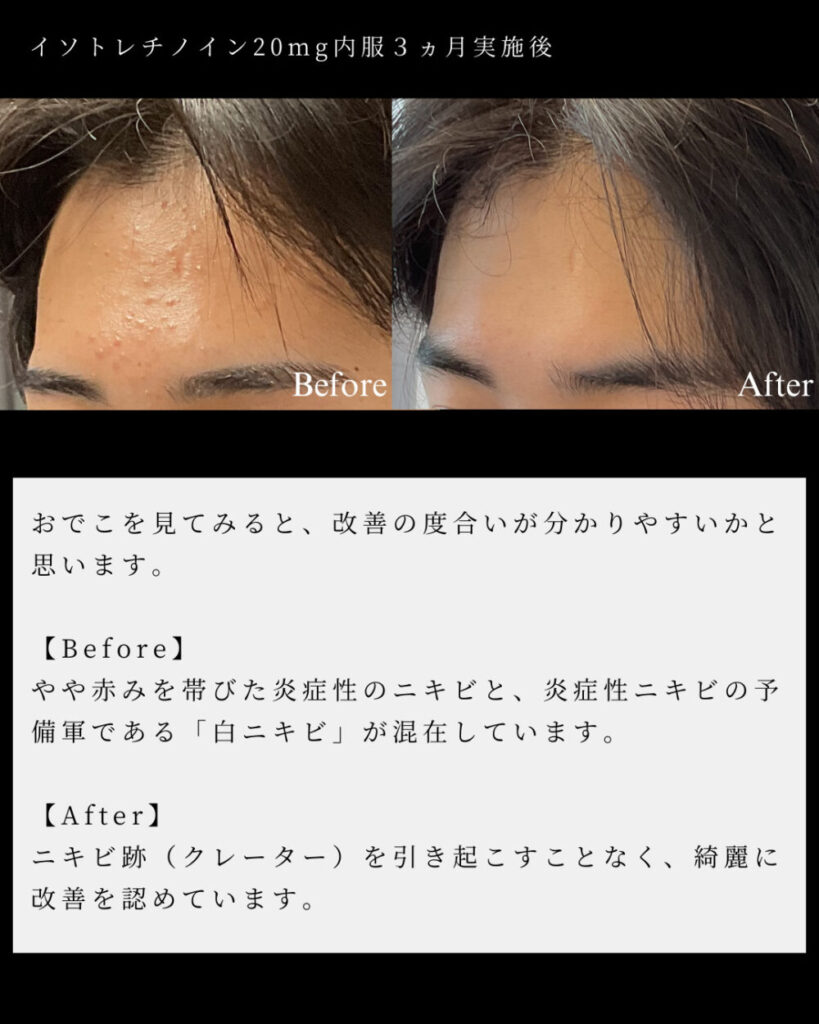

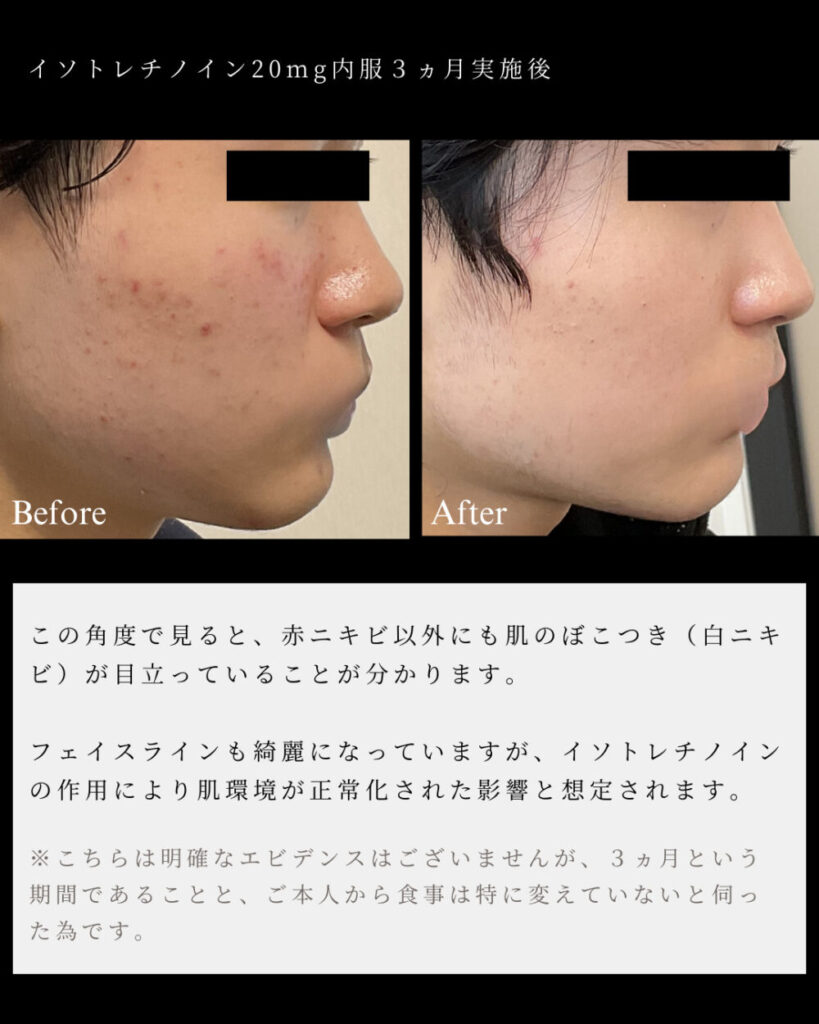
| Name of treatment | Isotretinoin oral therapy (20 mg) |
| Treatment | Isotretinoin is used to improve acne and oily skin by taking one tablet once a day. |
| Length of treatment | Average 6 to 9 months. |
| Charge | 10mg (30 days) 7,980 yen 20mg (30 days) 12,980 yen Tax included, free medical treatment |
| Risks and Side Effects | Must be sterilized due to teratogenicity Dry skin (especially lips) Changes in liver function, changes in lipid levels, joint and muscle pain, headache, dizziness, visual disturbances, photosensitivity, allergic reactions, changes in bone density |
Effects and Mechanisms
Effect
Main effects
- Improvement of acne
- Often no need to repeat acne (long-term remission)
- Can be effective against severe acne
side effect
- Improvement of oily skin
- Pores may become less visible.
- Less likely to develop blackheads in pores
- Skin luster may be increased
In one case, a patient who had been receiving insurance treatment (oral and topical) for 2 to 3 years but had not improved, showed improvement within 3 months of taking isotroin.
Three mechanisms of effectiveness
Mechanism 1: Decrease in skin oil content
Isotretinoin regulates sebaceous gland function and decreases skin oil secretion.This inhibits the overproduction of sebum, which causes acne, and reduces inflammation and clogged pores.
Isotretinoin also inhibits the activity of lipid synthase enzymes in sebaceous glands. Specifically, it reduces sebum secretion by inhibiting 5α-reductase and decreasing the size of sebaceous glands.
Reduced sebum production may, as a side effect, reduce the appearance of pores.
Mechanism 2: Suppression of inflammation
Isotretinoin also improves the symptoms of inflammatory acne. It exerts an anti-inflammatory effect on factors that cause inflammation, relieving symptoms such as redness and swelling.
It suppresses inflammation by modulating various mechanisms involved in the inflammatory response. Specifically, it reduces the production of inflammatory cytokines (IL-1, IL-6, IL-8, etc.) and alleviates inflammatory responses. It also suppresses T-cell activation and neutrophil migration, thereby reducing inflammation.
Mechanism 3: Improvement of turnover
Isotretinoin decreases pore clogging. This also improves pore-related problems such as powdery and blackheads.
It also improves epidermal cell differentiation and apoptosis (cell death) by regulating gene expression. Thereby,Normalization of skin turnoverThe result is a reduction in pore clogging.
Action to improve keratinization abnormalitiesIt also Reduces pore-clogging and inflammation by promoting normal keratinization and inhibiting excessive keratinization of the stratum corneum.
Because it improves turnover, skin luster may be increased as a side effect.
Concept of Total Amount|How long should the period of oral administration be?
When undergoing isotretinoin treatment, many peopleHow long do I have to drink it?"You may be asking yourself the question, "What is the best way to do this?
Actually, the answer to this question is."Total AmountThis is closely related to the concept of In this section, we will explain in simple terms the concept of total dosage and how to determine the duration of oral dosage based on this concept.
What is the total volume?
What is the total volume?Total dose per kg of body weightrefers to the total amount of the product. In isotretinoin therapy, this cumulative amount is an important indicator.
- Target integrated dose: 120-150 mg/kg
- Calculation method: (daily dose [mg/kg/day]) x (number of treatment days) = cumulative dose [mg/kg]
Why is the total amount important?
Treatment based on the total volume has the following advantages
- Long-term symptom improvement
- Reduced risk of recurrence
- Establishing the optimal treatment period for each individual patient
Estimated duration of oral administration based on the total amount
Duration of oral administration depends on body weight and daily dosagebut here are some general guidelines:
| gender | average body weight | Daily dosage | Estimated duration of internal use | Cumulative dose |
|---|---|---|---|---|
| masculine gender | 67 kg | 10 mg/day | Approx. 30 months | Approx. 134 mg/kg |
| 20 mg/day | Approx. 15 months | Approx. 134 mg/kg | ||
| female | 53 kg | 10 mg/day | Approx. 24 months | Approx. 136 mg/kg |
| 20 mg/day | Approx. 12 months | Approx. 136 mg/kg |
This is only a guideline, and the actual treatment period may vary from person to person.
On the choice between low and high doses:
- Advantages of low doses (10 mg/day):
- May lower the risk of side effects.
- Skin dryness and other symptoms may be mild.
- Benefits of higher doses (20 mg/day):
- The duration of treatment is shortened, which may lead to early results.
- Long-term compliance (keeping up with oral medication) may be improved.
Relationship between cumulative dose and treatment effect
Isotretinoin has the following effects on the sebaceous glands
- Reduces sebaceous gland size and activity
- Long-term suppression of sebum secretion
- Normalization of abnormal keratinization of follicular epithelium
- Suppression of inflammatory cytokine production
By reaching a sufficient cumulative dose, these effects work continuously, improving symptoms and reducing the risk of recurrence.This leads to
Importance of personalized treatment
The total volume is an important indicator, though,We do not provide uniform treatment to all.The following factors are taken into consideration to develop the best treatment plan for each individual patient
- Severity of symptoms
- body weight (usu. one's own)
- Presence and severity of side effects
- Responsiveness to treatment
- lifestyle
For example, the international standard is 0.5mg/kg-1.0mg/kg for 15-20 weeks. However, this is only the global standard, and it is better to adapt it to the characteristics of the Japanese.
Since there are fewer Japanese patients with severe acne compared to those in other countries, it is considered acceptable to start treatment with a lower dose. In many cases, the starting dose for Japanese patients is about 0.3 mg/kg.
Summary of total volume
The concept of totalization in isotretinoin therapy is an important indicator for effective and safe treatment.
However, this is only a guideline, and actual treatment will be adjusted in detail according to the individual patient's condition through periodic examinations.
We carefully evaluate each patient's condition to develop the best treatment plan. If you are considering isotretinoin treatment, please contact us for a consultation.
An example of treatment progress
Before treatment: Before the start of treatment

| Name of treatment | Isotretinoin oral therapy (20 mg) |
| Treatment | Isotretinoin is used to improve acne and oily skin by taking one tablet once a day. |
| Length of treatment | Average 6 to 9 months. |
| Charge | 10mg (30 days) 7,980 yen 20mg (30 days) 12,980 yen Tax included, free medical treatment |
| Risks and Side Effects | Must be sterilized due to teratogenicity Dry skin (especially lips) Changes in liver function, changes in lipid levels, joint and muscle pain, headache, dizziness, visual disturbances, photosensitivity, allergic reactions, changes in bone density |
1st month: 1 month
The skin, eyes, nose, and especially the lips may experience side effects. This occurs because the mechanism of isotretinoin is to shrink the sebaceous glands and reduce the oil content of the skin.
Some patients may also experience a temporary worsening of acne when isotretinoin is used for the first time. This can beAlso called the "initial flare" or "purging" period, it occurs when the drug expels impurities deep in the skin.It is said.

2nd month: 1
In most cases,Improvement of acne is often recognized at this point.It is. On the other hand, skin dryness and other side effects may persist or possibly worsen. The physician will usually evaluate the patient's response at this stage and adjust the dosage if necessary.

3rd-4th month:.
The majority of patients often show improvement at this point.It is.New outbreaks of acne are virtually eliminated and existing acne is cured.Some people experience side effects, but many patients learn how to manage them or (e.g., applying lip balm, etc.)

5th-6th month:.
Most patients complete the treatment. The skin is clean and new acne outbreaks are rare. Side effects may persist for some time after discontinuing drug use, but usually resolve with time.
*Please keep in mind that not all patients will show improvement over this course of time.
What happens after quitting? What is the recurrence rate?
Progress after quitting isotretinoin
The first few weeks after the end of the program:.
Skin dryness and other side effects may persist after treatment is completed. However, these side effects gradually diminish.
Months after closing:.
In many cases, acne is completely cleared and new acne outbreaks are controlled. Skin side effects are almost completely eliminated.
More than 6 months after completion:.
In some patients, acne may reappear after completion of treatment. This is usually not as severe as before and in most cases can be controlled with another isotretinoin treatment or other methods.
recurrence rate
There is no clear recurrence rate data, but it is safe to say that the disease rarely recurs. In a few cases, recurrence does occur, but in the majority of cases, it is not as severe as before.
Why is it unapproved and not covered by insurance in Japan?
In the U.S. and other countries, it has been covered by insurance for more than 30 years, but in Japan it is not.
The reasons involve side effects and difficulty in risk management.
One example is prenatal influences.
Isotretinoin is aPregnancy during or within a short period of time after use may cause serious fetal malformations or developmental disorders.Therefore, women who use them must implement strict pregnancy prevention. Such control and monitoring is difficult, and for this reason is considered unapproved for use in some countries.
Here we will also look at the opinions of physicians in Japan regarding the use of isotretinoin.

What is Acne Conglobata?
A form of acne or pyoderma that is more common in males and is characterized by multiple comedones, cysts, and nodules on the chest and back as well as on the face.


In summary,Many physicians see a need for isotretinoin treatment for refractory acneI guess you could say that.
Those who cannot be treated
Pregnant
Lactating
Those who are considering pregnancy
(Reason) As mentioned earlier, pregnancy during or within a short period of time after use may cause serious fetal malformations or developmental disorders.
Pediatric
Basically, it cannot be used for children under 12 years of age. 13-17 years of age will be considered for use after a specified period of time, etc., taking the situation into consideration.
At what age can it be taken internally?
Acne treatment guidelines in Europe and the United States stateCan be taken internally from age 12.(Conversely, those under 12 years of age are not allowed to take it). (Conversely, it should not be taken by anyone under 12 years of age.)
So, to begin with, "Why should we care about age?" I would like to explain why we need to be concerned about age. It is the "effect on bones," or in other words. may affect height growth (bone growth)."The first time the product is used, it will be from the
This one may be mentioned in theory, though,According to clinical studies (medical papers)Isotretinoin taken internally for as short a period as six months "does not have a significant impact."It is mentioned that
Acne is at risk of remaining as "craters" and "hyperpigmentation" in the long term. Since we are a cosmetic dermatology clinic, we also treat patients suffering from craters and hyperpigmentation, especially craters, which are difficult to improve. Therefore, we believe that there is great merit in treating acne with isotretinoin as early as possible.
Risks and Side Effects
Serious side effects
(1) Fetal malformation, miscarriage, stillbirth, premature birth
(2) Serious mental illness such as depression, psychosis (hallucinations, auditory hallucinations), self-injurious behavior, and suicide attempts
Likely Side Effects
(3) Dry skin and mucous membranes
Isotretinoin shrinks the sebaceous glands, reducing the oil content of the skin and mucous membranes. This causes dry lips, dry nose, dry eyes, and excessively dry skin.
Dryness of the mucous membranes of the nose may cause "nosebleeds".
Other side effects
(4) Changes in liver function
Isotretinoin is taxing on the liver and can cause abnormal liver function in some patients. Therefore, periodic liver function tests are required during treatment.
(5) Fluctuations in lipid levels
Isotretinoin can raise cholesterol and triglyceride levels in the blood. This is especially important for patients at risk for cardiovascular disease.
(6) Joint and muscle pain
Some patients experience joint and muscle pain. This usually improves after treatment is interrupted or completed.
(7) Headache, dizziness, visual disturbance
Some isotretinoin users have been reported to experience headaches, dizziness, or visual disturbances. Changes in visual acuity and reduced night vision, in particular, may affect driving and other aspects of daily life.
(8) Photosensitivity
Isotretinoin users may be more sensitive to sunlight. Therefore, appropriate precautions should be taken to avoid sunburn.
(9) Allergic reaction
Isotretinoin can cause allergic reactions in rare cases. These include skin rashes, hives, severe itching, difficulty breathing, irregular heartbeat, and swelling (especially of the face and throat).
(10) Change in bone density
Prolonged use of high doses of isotretinoin may cause changes in bone density and arrest of bone growth.
precautions
Please use contraception if you have sexual intercourse during the period of taking the drug and during the month before and after the period of taking the drug.
Do not become pregnant, breastfeed, or donate blood during the period of taking the drug and for one month thereafter.
*Transfusion of blood to a pregnant woman may cause isotretinoin effects in the fetus.
・Please refrain from peeling or waxing during isotretinoin treatment and for 6 months after treatment.
Invasive laser therapy is not available during treatment.
Do not share isotretinoin with others.
Acne may temporarily worsen after treatment begins.
Isotretinoin should only be used under the close supervision of a physician, pharmacist, or other professional.
Pregnancy or possible pregnancy may cause birth defects, miscarriage, premature birth, or stillbirth in the fetus.
Severe headaches, blurred vision, dizziness, nausea, vomiting, stroke, diarrhea, muscle weakness, and other serious psychological symptoms
(depression, suicide, etc.) side effects may occur.
They should never be purchased without a professional consultation.
It should never be taken if you are pregnant, plan to become pregnant, or have the possibility of becoming pregnant.
There are websites that sell drugs without a prescription, which is illegal and dangerous.
(Source.)Alert regarding ACCUTANE (a drug for the treatment of intractable acne not approved in Japan) (Ministry of Health, Labour and Welfare)
Treatment Flow
Our clinic is by appointment only. Please click here to make an appointment before coming to our clinic.
We will ask you about your current concerns and past experience with acne treatment. If you are eligible for isotretinoin treatment and wish to undergo treatment, we will explain the risks and ask you to sign a consent form. After that, we will take pictures to record the condition of your skin before the treatment.
We will perform this service when necessary after medical examination.
First, we will prescribe a 30-day supply.
We will confirm the treatment effect, side effects, etc. approximately one month later.
Charge
Isotretinoin 10mg (30caps)
Isotretinoin 10mg (30caps)
7,980 yen (tax included)
7,980 yen (tax included)
Isotretinoin 20mg (30caps)
Isotretinoin 20mg (30caps)
12,980 yen (tax included)
12,980 yen (tax included)
Blood tests may be performed if necessary after examination.
3,500 yen for Jimbocho clinic and 6,000 yen for Yokohama clinic will be charged for blood test.
Smart Skin Clinic Features
Efficacy of isotretinoin for "seborrheic dermatitis
Here we introduce the efficacy of isotretinoin for the disease "seborrheic dermatitis".
There are two reasons why we are introducing this program
- Despite the fact that many people are suffering from the disease, no "curative treatment" has been established. (as of March 2024) (medically speaking, evidence has not been established)
- There have been cases in which isotretinoin has cured seborrheic dermatitis. In addition, several papers have begun to appear showing the efficacy of isotretinoin for seborrheic dermatitis.
➊Current status of seborrheic dermatitis|No curative therapy has been established.
So let's start with "What is seborrheic dermatitis?" What are the causes? What is the current treatment for seborrheic dermatitis? Next, I will provide the evidence that isotretinoin is a good option for seborrheic dermatitis.
First, please see this summary of seborrheic dermatitis from a reliable medical website.
Seborrheic dermatitis is a common inflammatory disease of the skin in areas of high sebaceous gland density (e.g., face, scalp, sternum).Cause unknown.is a yeast-like fungus that is endemic to the skin.Malasseziagenus fungi play an important role. Seborrheic dermatitis occurs with increased frequency in HIV-infected patients and in patients with certain neurological disorders. Seborrheic dermatitis sometimes presents with itching, dandruff, and yellowish, greasy scales on the scalp, hairline, and face. The diagnosis is made on examination.Treatment is with antifungals, topical corticosteroids, tar, and keratolytics.
Seborrheic Dermatitis (MSD Manual Professional Edition)
There are two important points.
- The "cause is not understood" at this time.(Non-medical professionals may be surprised to learn that there are many diseases whose causes are unknown. For example, there is a disease called "migraine headache" for which no clear cause has been found. The same is true for "chloasma.)
- The existence of numerous treatment options.What this means is that we may not be able to treat the "true cause" because the cause is unclear. As you can see with a little thought, if there is a medicine that says "this will surely cure the disease," it is enough if one exists.
What does that mean?Since the root cause of the disease is unknown and no cure has been established, many people have tried various treatments but have been troubled by the lack of improvement."That is to say.
How can you be so sure?" You might think, "Because I was one of them.
In fact, I had been suffering from dandruff for 10 years, but when I took isotretinoin for acne treatment, my seborrheic dermatitis was cured, although I had not expected it.
From there, I researched papers and found some interesting facts. Next, I will introduce the reasons why isotretinoin was effective and the medical evidence.
Mechanism of isotretinoin efficacy in seborrheic dermatitis (hypothesis)
As we have explained, the main actions of isotretinoin are"Retraction of sebaceous glands = reduced sebum secretion."This is the action of the
The causes of seborrheic dermatitis are not clearly understood, but the following mechanisms are thought to be involved
By some mechanism, a fungus called "Malassezia" is activated and the skin reacts to the substances produced by this fungus.
Malassezia, a mold fungus, is medically called a "fungus. Therefore, drugs that kill this fungus are called "antifungal drugs. That is why "antifungal drugs" are listed as one of the treatments for seborrheic dermatitis.
However, if Malassezia is activated by "some mechanism", I think you can see that we have not solved the root of the problem.
In fact, in seborrheic dermatitis,Sebum production is on the rise."It is also said that And Malassezia isSebum is the source of their nutritional needs."There is a story that
In other words, the hypothesis is that the root cause is sebum, which activates Malassezia. In this way of thinking,Isotretinoin, which suppresses sebum secretion, may be the root solution.So.
Now, this is just my hypothesis as a cosmetic dermatologist, so let me show you the actual paper.
The first will be an article published in the medical journal International Journal of Dermatology in June 2023.
Study evaluated patients diagnosed with moderate to severe seborrheic dermatitis and treated with oral isotretinoin between January 2019 and December 2020.
The study concluded that 48 patients with moderate to severe seborrheic dermatitis treated with isotretinoin showed statistically significant improvement in their symptoms.
Given its efficacy and safety, oral isotretinoin can be used to treat patients with moderate to severe seborrheic dermatitis.
Zhang Yanfei, et al. Efficacy and safety of oral isotretinoin in the treatment of moderate to severe seborrheic dermatitis: a retrospective study. Int J Dermatol. 2023 Jun;62(6):759-763.
The second paper was published in a similar medical journal in January 2017.
This study was conducted to determine the efficacy and safety of isotretinoin for the treatment of moderate to severe seborrheic dermatitis of the scalp and face.
Forty-five patients were recruited for the study, half were treated with isotretinoin and half with topical agents.
The results showed that isotretinoin relieved the symptoms of seborrheic dermatitis, leading to the conclusion that isotretinoin may be an effective treatment for seborrheic dermatitis.
ConclusionLow-dose oral isotretinoin may be a therapeutic modality for moderate to severe seborrhea and seborrheic dermatitis.
Cristhine de Souza Leão Kamamoto. et al. Low-dose oral isotretinoin for moderate to severe seborrhea and seborrheic dermatitis: a randomized comparative trial. Int J Dermatol. 2017 Jan;56(1):80-85.
To summarize the above,
- Seborrheic dermatitis is sometimes said to be "incurable," but in my own experience (N=1), isotretinoin almost cured the disease.
- In medical publications, the "efficacy" and "safety" of isotretinoin for seborrheic dermatitis have been verified at a certain level, suggesting that it may be a treatment option.
- In light of the above, it can be said that those with seborrheic dermatosis who continue to have problems without improvement with current treatment may benefit from trying the treatment of oral isotretinoin.
If you have persistent problems with seborrheic dermatitis, please contact Smart Skin Clinic.
FAQ
- I am afraid of isotretinoin because I am worried about side effects, is it safe?
-
If you are doing a lot of research, you may be worried about side effects. Since there are many side effects listed, you may think that any of them will surely occur, but those with a non-zero probability are listed because they need to be listed, so there is no need to be worried about all of them.
The important thing is to carefully consider the effects and the side effects/risks. Effectiveness means that if using isotretinoin improves your acne, it could have a significant impact on your quality of life.
The side effects of isotretinoin are varied, but the most serious one teratogenicity. As stated in the precautions, "Always use contraception if you are sexually active during the period of taking isotretinoin and the month before and after." The risk of side effects can be lowered by taking the following risk management precautions.
In addition, there will be periodic doctor's visits, so if side effects occur, we will discuss and address them together.
- When will it take effect?
-
Although there are individual differences, in most cases, the effects are realized in about two months.
- Do the effects persist after the end of oral administration?
-
It will persist. Note, however, that some sebaceous glands may return to their original state, so not all patients can be prevented from recurrence. Even in cases where recurrence does occur after discontinuation of the drug, the symptoms are usually less severe than before taking the drug.
- What should I do if my acne recurs?
-
Basically, at the time of recurrence, the disease is usually milder than before. Treatment often includes topical (topical) therapy (ointment) or oral antibiotics, which were used before isotretinoin therapy was initiated.
- Can I undergo other cosmetic procedures while taking medication? Is it ok to do things like hair removal?
-
Basically, there is no problem. On the other hand, hair removal is recommended after discontinuation of isotretinoin. Recent studies have shown that it is safe to undergo laser hair removal while taking isotretinoin, but medical hair removal is risky because of its high power output.
- What should I do if I forget to take it?
-
If you miss a dose for one day, skip it and resume taking one tablet per day on the following day. Be careful not to take two tablets the next day.
- Does it work for back acne, etc. other than on the face?
-
There are. It acts on the whole body.
References and Bibliography
・Alert regarding ACCUTANE (a drug for the treatment of intractable acne not approved in Japan) (Ministry of Health, Labour and Welfare)
・Hayashi, N., Sasaki, M., Kurokawa, I. et al., A survey on the frequency of patients with acne conglobata and severe acne and dermatologists' attitudes toward oral isotretinoin in Japan, Journal of the Japanese Society of Clinical Dermatology. Journal of the Japanese Society of Clinical Dermatology, Vol. 38, No. 4, p. 629-634, 2021.
・Nast A et al: European evidence-based (S3) guideline for the treatment of acne - update 2016 - short version. J Eur Acad Dermatol Venereol. 2016, 30, 1261-1268
Clinic List
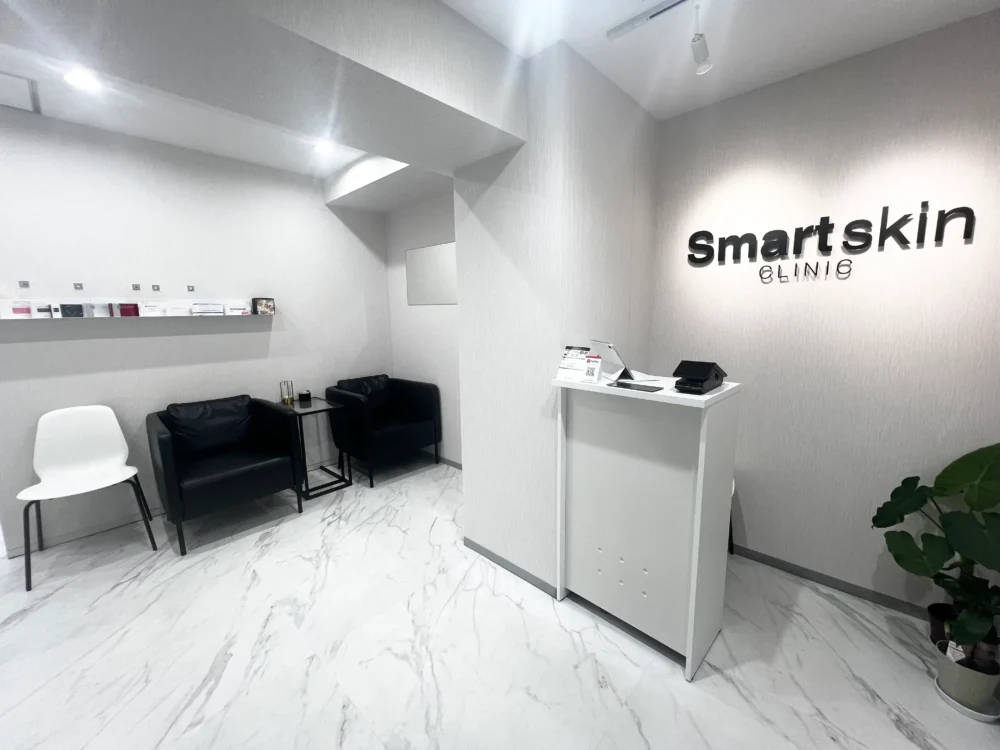
Jimbocho Institute
〒101-0054
EX Kanda Nishiki-cho Building 8F (general reception), 3-16-1 Kanda Nishiki-cho, Chiyoda-ku, Tokyo 7F
Business hours: Monday-Friday 11:00-20:00 / Saturday and Sunday 10:00-19:00
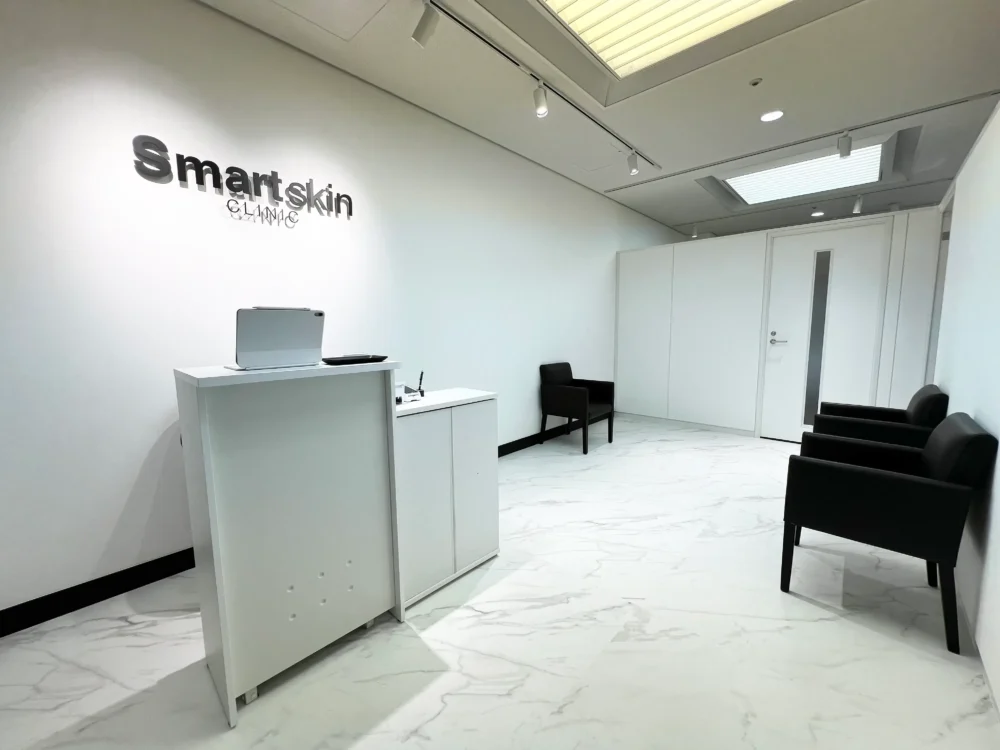
Yokohama Institute of Technology
〒221-0835
TS Plaza Bldg. 2F, 2-23-2 Tsuruya-cho, Kanagawa-ku, Yokohama-shi, Kanagawa
Business hours: 10:00-19:00
About the physician supervision of this site
This site is operated under the supervision of a physician supervised by Smart Skin Clinic.
This page was revised and enacted in June 2018. Medical Advertising Guidelines We produce and provide information based on
- Scope of supervision: treatment description, risks and side effects, price labeling
- Last supervision date: June 26, 2025
![Official] Smart Skin Clinic|Aesthetic Dermatology Group (Jimbocho, Yokohama)](https://smartskin-clinic.com/wp-content/uploads/2023/05/Smart-skin-clinic-ロゴ500-×-100-px.png)

